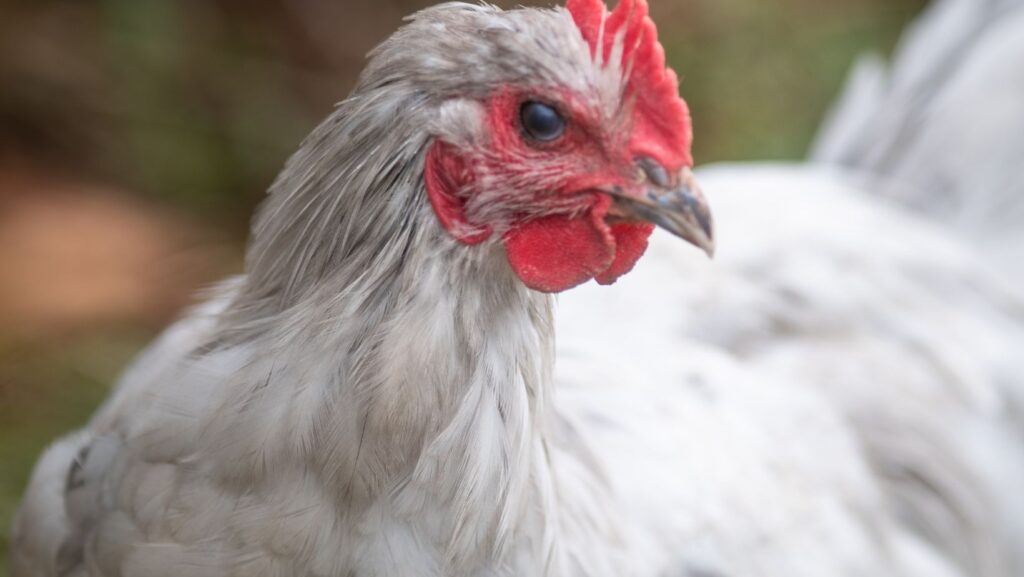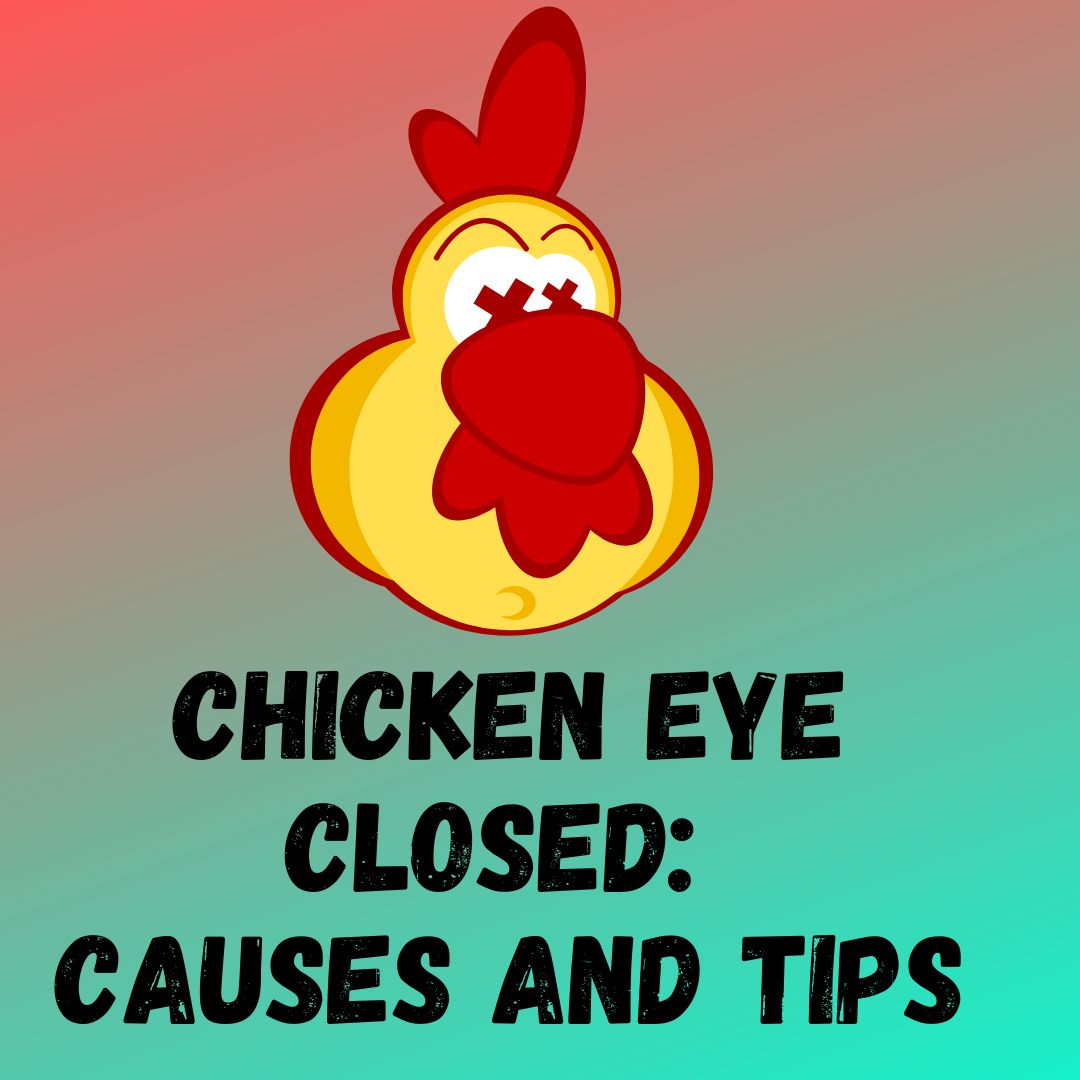When it comes to the intriguing world of chickens, one particular aspect that piques curiosity is the phenomenon of a closed eye. While chickens are known for their distinctive appearance and behaviors, observing a chicken with its eye closed raises questions about the reasons behind this seemingly unusual occurrence.
Chickens, like many other animals, possess a pair of eyes that play a vital role in their survival and navigation of the world around them. Their eyes are typically wide open, allowing them to gather visual information and detect potential dangers or food sources. However, instances where a chicken’s eye remains closed can be observed under various circumstances, leading us to explore the possible causes.
Post Contents
- 18 Eye Problems With Chickens: Causes and Measures
- Conjunctivitis:
- Eye Injuries:
- Eye Worm Infestation:
- Corneal Ulcers:
- Infectious Coryza:
- Eye Infections:
- Nutritional Deficiencies:
- Ammonia Fumes:
- Chronic Respiratory Disease (CRD):
- Avian Chlamydiosis:
- Infectious Coryza (IC):
- Infectious Laryngotracheitis (ILT):
- Infectious Bronchitis:
- Avian Influenza (AI):
- Swollen Head Syndrome (SHS):
- Aspergillosis:
- Eye Worms (Oxyspirurosis):
- Cryptosporidiosis:
- 5 Reasons for Lethargic Baby Chick With Closed Eyes
- What to do: How to help a chicken with closed eyes?
- Summary
18 Eye Problems With Chickens: Causes and Measures

Chickens can experience various eye problems that can affect their vision and overall health.
Conjunctivitis:
Also known as “pink eye,” conjunctivitis is an inflammation of the conjunctiva, the thin membrane that covers the white part of the eye and lines the inside of the eyelids. It can be caused by infections, irritants, or allergies, and symptoms include redness, swelling, discharge, and closed or watery eyes.
Eye Injuries:
Chickens may suffer from eye injuries due to pecking, fights, or accidents. These injuries can range from minor scratches to more severe damage, such as corneal ulcers. Signs of eye injuries include swelling, redness, discharge, cloudiness, or closed eyes. Eye injuries can also result from foreign material or injuries caused by excessive preening or pecking by other chickens.
- Treatment: Mild cases can be managed by flushing the eye with saline solution. Applying a broad-spectrum topical antibiotic (such as terramycin or neomycin) helps prevent secondary infections. Severe cases require veterinary attention.
- Recommended Action: Ensure a safe environment to prevent injuries. Separate aggressive chickens and remove potential hazards from the coop.
Eye Worm Infestation:
Certain parasitic worms, such as Oxyspirura mansoni, can infest the eyes of chickens. These worms reside in the sinuses and can cause irritation, inflammation, and damage to the eyes, leading to symptoms like closed or swollen eyes.
Corneal Ulcers:
Corneal ulcers are open sores or erosions on the cornea, the clear front surface of the eye. They can result from trauma, infections, or other underlying eye conditions. Corneal ulcers can cause pain, redness, discharge, and may lead to closed or squinting eyes.
Infectious Coryza:
Infectious Coryza is a bacterial respiratory disease that can also affect the eyes of chickens. It can cause swollen sinuses, nasal discharge, and conjunctivitis, leading to closed or swollen eyes.
Eye Infections:
Chickens can develop bacterial or viral infections that specifically target the eyes, such as Mycoplasma gallisepticum or Newcastle disease virus. These infections can result in conjunctivitis, discharge, redness, and closed eyes.
Nutritional Deficiencies:
Inadequate nutrition, particularly deficiencies in vitamin A, can affect the health of chickens’ eyes. Vitamin A deficiency can lead to eye problems, including impaired vision, cloudiness, or corneal abnormalities.
Ammonia Fumes:
Prolonged exposure to ammonia fumes can irritate the eyes and cause infections.
- Treatment: Add Yucca schidigera extract to the feed. Improve ventilation in the chicken coop to reduce ammonia exposure.
- Recommended Action: Properly ventilate the coop and maintain good air quality. Keep litter clean to minimize ammonia buildup.
Chronic Respiratory Disease (CRD):
CRD is caused by the bacterium Mycoplasma gallisepticum and manifests as eye discharge, coughing, sneezing, and abnormal breathing sounds.
- Treatment: Administer oral antibiotics like doxycycline or tiamulin. Use probiotics to support gut health.
- Recommended Action: Practice good biosecurity measures to prevent the spread of CRD. Isolate sick birds and disinfect the coop.
Avian Chlamydiosis:
Chlamydiosis is a zoonotic disease caused by the bacterium Chlamydia. Symptoms include eye discharge, nasal discharge, ruffled feathers, and lethargy.
- Treatment: Administer a long course of oral antibiotics such as doxycycline.
- Recommended Action: Practice good hygiene and limit exposure to contaminated dust or feathers. Consult a veterinarian for diagnosis and treatment.
Infectious Coryza (IC):
IC is an acute disease of the upper respiratory tract caused by Avibacterium paragallinarum. It results in severe eye infections and other symptoms like gurgling sounds and reduced appetite.
- Treatment: Use antibiotics like enrofloxacin, sulfadimethoxine, or tylosin.
- Recommended Action: Isolate infected birds, practice strict biosecurity measures, and disinfect the coop.
Infectious Laryngotracheitis (ILT):
ILT is a contagious condition of the upper respiratory tract caused by the infectious laryngotracheitis virus.
- Treatment: Provide symptomatic relief. Colloidal silver can be used to alleviate symptoms.
- Recommended Action: Vaccination is the best prevention method. Isolate and treat infected birds. Implement strict biosecurity measures.
Infectious Bronchitis:
Infectious bronchitis is caused by a coronavirus and manifests as respiratory symptoms, eye infections, and reduced egg production.
- Treatment: Supportive care and symptom management. No specific treatment for the virus.
- Recommended Action: Vaccination is the best preventive measure. Maintain good hygiene and biosecurity practices.
Avian Influenza (AI):
Avian influenza is a highly contagious viral disease that can cause eye infections.
- Treatment: Administer oral antivirals like amantadine or rimantadine.
- Recommended Action: Practice strict biosecurity measures. Report any suspected cases to veterinary authorities.
Swollen Head Syndrome (SHS):
SHS is an acute infection of the upper respiratory system caused by the Avian Metapneumovirus.
- Treatment: Supportive care. Antibiotics may be used to prevent secondary infections.
- Recommended Action: Practice good hygiene, maintain proper ventilation, and provide a balanced diet.
Aspergillosis:
Aspergillosis is a fungal infection of the respiratory tract caused by Aspergillus fumigatus.
- Treatment: Use antifungal medications like ketoconazole, itraconazole, or amphotericin B.
- Recommended Action: Maintain a clean and dry environment. Improve ventilation and reduce dust.
Eye Worms (Oxyspirurosis):
Oxyspirurosis is caused by the roundworm Oxyspirura mansoni and is transmitted through infected cockroaches.
- Treatment: Use ivermectin or a 5% cresol solution. Physical removal by a veterinarian may be necessary.
- Recommended Action: Control cockroach populations to minimize transmission. Keep the coop clean and free from pests.
Cryptosporidiosis:
Cryptosporidiosis is a parasitic disease caused by Cryptosporidium species. It can result in eye infections, diarrhea, and respiratory symptoms. Treatment involves the use of the antibiotic paromomycin.
- Treatment: Administer paromomycin orally.
- Recommended Action: Practice good hygiene and prevent fecal contamination. Provide clean water sources and proper sanitation.
In all cases, it is important to consult with a veterinarian who specializes in poultry to accurately diagnose the specific cause of the eye infection and determine the most appropriate treatment approach.
5 Reasons for Lethargic Baby Chick With Closed Eyes
A lethargic baby chick with closed eyes can be a cause for concern as it may indicate an underlying health issue. Here are some possible reasons for a lethargic baby chick with closed eyes and some general guidelines on what to do:
- Infectious diseases: Baby chicks are susceptible to various infectious diseases such as bacterial or viral infections. These infections can cause symptoms like lethargy and closed eyes. It is important to isolate the affected chick from the rest of the flock to prevent the spread of infection.
What to do: Consult a veterinarian who specializes in poultry to get a proper diagnosis and appropriate treatment for the specific infectious disease.
- Nutritional issues: Inadequate nutrition or improper feeding can lead to weakness and lethargy in baby chicks. Nutritional deficiencies, such as vitamin or mineral deficiencies, can affect their overall health and vitality.
What to do: Ensure that the chicks are receiving a balanced and appropriate diet. Consult a veterinarian or an experienced poultry breeder for guidance on proper chick nutrition and feeding practices.
- Dehydration: Dehydration can cause lethargy and closed eyes in baby chicks. It can occur if the chicks do not have access to clean water or if they are not drinking enough.
What to do: Make sure the chicks have access to fresh and clean water at all times. Monitor their water intake and encourage drinking by using shallow waterers or dipping their beaks in water to stimulate their thirst response. If the chick appears severely dehydrated, seek immediate veterinary attention.
- Temperature-related issues: Baby chicks are sensitive to temperature extremes. If they are too cold or too hot, it can affect their energy levels and cause them to become lethargic. Closed eyes can be a sign of discomfort or stress due to improper temperature regulation.
What to do: Ensure that the brooder temperature is appropriate for the chicks’ age. Provide a heat source, such as a heat lamp or a brooder plate, to maintain a warm and comfortable environment. Monitor the temperature regularly and make adjustments as needed.
- Stress or handling: Excessive stress or improper handling can impact the well-being of baby chicks, causing them to become lethargic and exhibit closed eyes.
What to do: Minimize stressors and handle the chicks gently and with care. Avoid overcrowding, sudden loud noises, or excessive disturbances in their environment. Provide a calm and quiet brooder area.
What to do: How to help a chicken with closed eyes?
- Wiping chicken eyes: Gently clean the chicken’s eyes with a clean, damp cloth or cotton pad to remove any discharge, dust, or debris that may be causing the closure. Be careful not to apply excessive pressure or cause further injury.
- Quarantine new chickens: If you introduce new chickens to your flock, it’s important to quarantine them for a period of time to prevent the spread of diseases. This can help control infectious causes of closed eyes, such as infectious coryza.
- Control pests in the coop: Regularly inspect and treat the coop for pests, such as mites or lice, which can cause irritation to the chickens’ eyes. Follow appropriate pest control measures to eliminate these parasites.
- Keep the coop clean: Maintain a clean and well-ventilated coop to minimize dust particles and prevent the buildup of bacteria or other pathogens that can cause eye-related issues. Regularly clean bedding, remove droppings, and ensure proper ventilation.
- Reduce heat in the coop at night: During hot weather or heatwaves, it’s important to provide adequate ventilation and reduce heat stress in the coop. Ensure good airflow, provide shade, and consider using fans or cooling methods to lower the temperature inside the coop.
Summary
In conclusion, a chicken closing its eye is not a rare or unnatural occurrence. Sleep, injury, illness, and environmental factors can all play a role in a chicken’s decision to close its eye, each with its own distinct purpose. Observing a chicken in this state can serve as a reminder of their vulnerability, as well as their ability to adapt and protect themselves in various situations.
Next time you come across a chicken with a closed eye, you can appreciate the fascinating complexity of their behaviors and the significance behind this seemingly simple action.

94% of pet owners say their animal pal makes them smile more than once a day. In 2007, I realized that I was made for saving Animals. My father is a Vet, and I think every pet deserves one. I started this blog, “InPetCare”, in 2019 with my father to enlighten a wider audience.
